

Using Concept Routines to Drive Inquiries. Exploring concepts through inquiry can be a tricky area of teaching and learning to navigate.
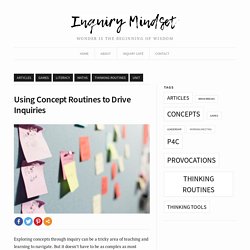
But it doesn’t have to be as complex as most people think. Concept routines are effective tools to help make students’ thinking visible and gather the data you need to set-up future investigations. A meaningful inquiry can be well-planned and structured without stifling creativity or giving too much away. These concept routines will help you to assess your students’ level of understanding, while giving you the data you need to drive your inquiries forward. True or False. Use these routines frequently, so they become an integral part of the learning process in your classroom. Curriculum design. This activity examines the nature of curriculum frameworks, the choices which are made in the process of their development and characteristics which they share.
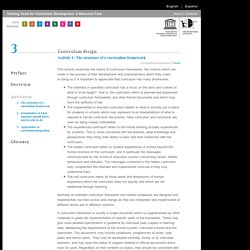
In doing so it is important to appreciate that curriculum has many dimensions: Teaching Frameworks. From Term 1 2017, Victorian government and Catholic schools will use the new Victorian Curriculum F-10.
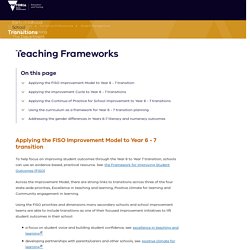
Curriculum related information is currently being reviewed and may be subject to change. To help focus on improving student outcomes through the Year 6 to Year 7 transition, schools can use an evidence-based, practical resource. ContinuaForSchoolImprovement. The ‘so what’ of learning… Action is the ‘so what’ of learning… “PYP schools can and should meet the challenge of offering all learners the opportunity and the power to choose to act; to decide on their actions; and to reflect on these actions in order to make a difference in and to the world.”
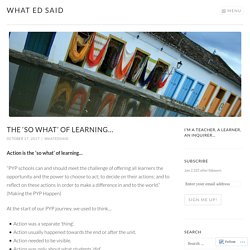
(Making the PYP Happen) At the start of our PYP journey, we used to think… Curriculum area advice. Inquiry: What Trajectory Are YOU On? – HonorsGradU. This week, I had the privilege to volunteer at my old school as one of the trainers for professional development day.

I was asked to focus one of the workshops on inquiry planning and concept-based instruction in science and social studies. But the more I prepared, the more I realized that when it comes to inquiry, it’s not so much WHAT we do, as much as HOW we APPROACH. So instead of spending our hour discussing science/social studies-specific ideas, we started off with a personal inquiry inventory, adapted from a couple posts by Kath Murdoch. Next, participants used their inventory responses to determine which area of inquiry they wanted to investigate more. As participants researched, they were also on the hunt for a sentence-phrase-word that helped them determine the difference between the same science/social studies activity used in a traditional teacher-driven classroom vs. an inquiry, concept-driven classroom.
I used to think that students need to be taught. Concept learning: Abstract concepts at play as little people think big. At most schools a reading of Charlotte's Web might end with a bunch of little spiders made from pipe cleaners and a few tears at the poignancy of the story itself.
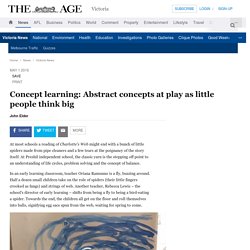
At Preshil independent school, the classic yarn is the stepping off point to an understanding of life cycles, problem solving and the concept of balance. In an early learning classroom, teacher Oriana Ramunno is a fly, buzzing around. Half a dozen small children take on the role of spiders (their little fingers crooked as fangs) and strings of web. Another teacher, Rebecca Lewis – the school's director of early learning – shifts from being a fly to being a bird-eating a spider. Towards the end, the children all get on the floor and roll themselves into balls, signifying egg sacs spun from the web, waiting for spring to come.
Loaded: 0% Progress: 0% How small children learn about big concepts Science behind Melbourne's crazy spring weather Four schools to open in inner-city Elderly man accidently run over by wife Clayton South. Segment 1: What is Concept-Based Learning? Learning about Sustainability Mapping document 20 Jan 2017. What’s the big idea? Breaking Traditional Moulds - Sam Sherratt. What is Concept-Based Learning? Concept based learning… ‘Hands up if you often forget the things you learn in class.’ ‘Hands up if you’re sometimes overwhelmed by information overload.’ Both times, all hands go up, including mine and Jocelyn’s. I’m in her Year 6 class to help them consider the big ideas in their learning and develop their understanding of concepts. This will assist them to organise information in future, explore significant ideas, promote higher order thinking and deepen inquiry. I show them the avocado model… They quickly get the idea that the big ideas we remember, long after we have forgotten the details, become the seeds from which new learning grows.
What is a ‘big idea’? In considering what such ‘big ideas’ might look like, we talk about the fight Ellie had with her brother this morning. Concept based learning. How to Teach a Concept Attainment Lesson. Concept based Curriculum. Attachment EY Concept Driven Curriculum KHN 4 22 Mar 2018. 0910 v27n1p8 Deep Learning Donham 2. Sometimes we DO have to reinvent the wheel... — Kath Murdoch. My work takes me into all kinds of schools with all kinds of curriculum frameworks designed to support inquiry learning.
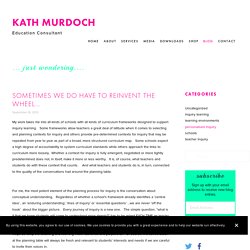
Some frameworks allow teachers a great deal of latitude when it comes to selecting and planning contexts for inquiry and others provide pre-determined contexts for inquiry that may be repeated from year to year as part of a broad, more structured curriculum map. Some schools expect a high degree of accountability to system curriculum standards while others approach the links to curriculum more loosely. Whether a context for inquiry is fully emergent, negotiated or more tightly predetermined does not, in itself, make it more or less worthy.
It is, of course, what teachers and students do with these context that counts. Structure. The Australian Curriculum: Humanities and Social Sciences may be implemented as a combined F–6 program or as an F–7 program. Structure. The Australian Curriculum: History is organised into two interrelated strands: historical knowledge and understanding and historical inquiry and skills.
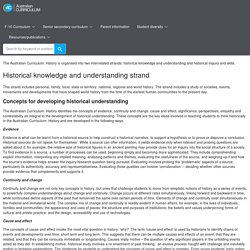
This strand includes personal, family, local, state or territory, national, regional and world history. The strand includes a study of societies, events, movements and developments that have shaped world history from the time of the earliest human communities to the present day. The Australian Curriculum: History identifies the concepts of evidence, continuity and change, cause and effect, significance, perspectives, empathy and contestability as integral to the development of historical understanding. These concepts are the key ideas involved in teaching students to think historically in the Australian Curriculum: History and are developed in the following ways: Evidence.
Key ideas. Key ideas In the Australian Curriculum: Science, there are six key ideas that represent key aspects of a scientific view of the world and bridge knowledge and understanding across the disciplines of science, as shown Figure 1 below.
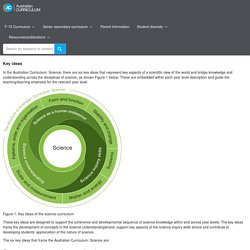
Structure. Structure The Australian Curriculum: Geography is organised in two related strands: geographical knowledge and understanding, and geographical inquiry and skills.
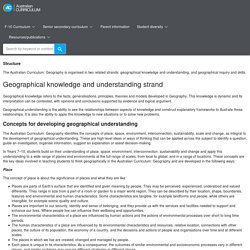
Geographical knowledge refers to the facts, generalisations, principles, theories and models developed in Geography. This knowledge is dynamic and its interpretation can be contested, with opinions and conclusions supported by evidence and logical argument. Structure. Structure. The Australian Curriculum: Economics and Business is organised in two related strands: economics and business knowledge and understanding, and economics and business inquiry and skills. In both these strands, the study of economics and business issues, events and business case studies form an integral component of the curriculum.
A focus on contemporary issues, events and business case studies stimulates student interest and curiosity.